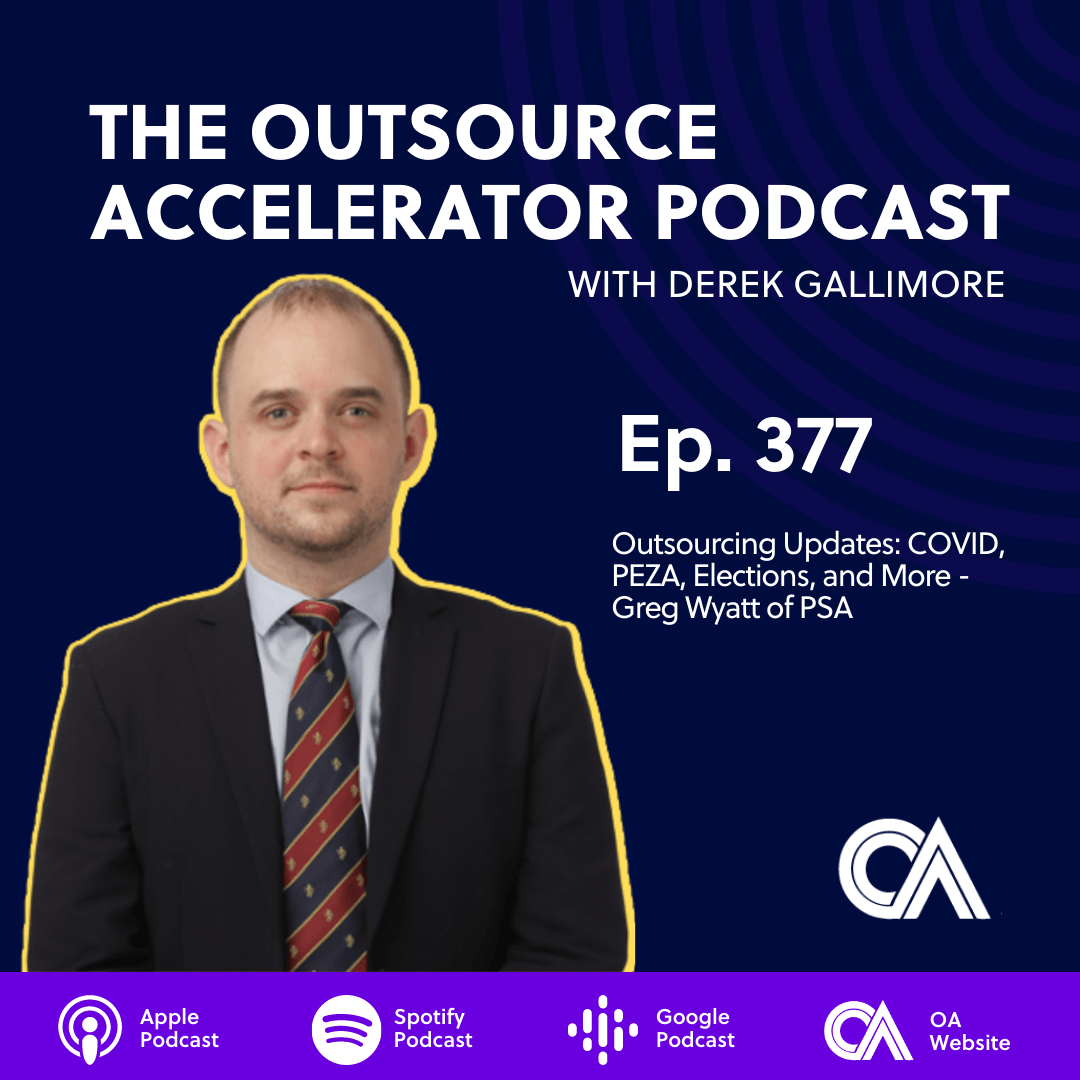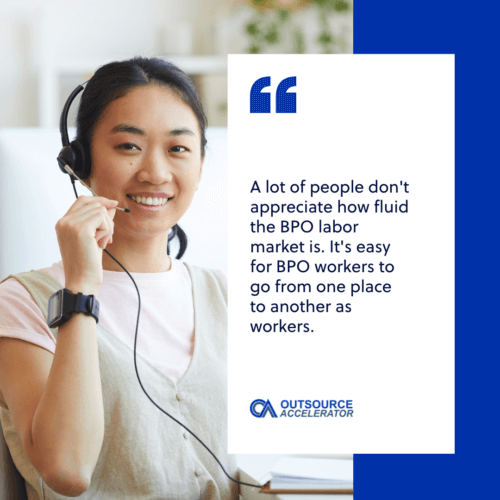Outsourcing Updates: COVID, PEZA, Elections, and More – Greg Wyatt of PSA

A regular guest on the OA podcast, Greg Wyatt is the Director of Business Intelligence at PSA Intelligence (formerly PSA Consultancy). PSA Intelligence is a business risk consultancy group in Manila catering to international clients and helping them reach international security standards.
PSA Consultancy
Derek Gallimore talks with Greg Wyatt, Director of Business Intelligence at PSA Consultancy. Based in Makati, Philippines, the company provides risk consultancy services to businesses of all sizes. Greg has been a guest in previous episodes of the podcast.
After lockdowns and surges due to Omicron, many areas in the Philippines have finally eased their restrictions along with businesses fully opening up. In this episode, Derek and Greg will provide updates on the COVID cases in the country, regulatory amendments in foreign investments, and the upcoming elections.

COVID updates in the Philippines
The Omicron surge
As Greg recalls, the Omicron cases in the country “went up extremely quickly,” causing a tremendous workforce disruption. Luckily, cases gradually went down to more than 1,000 per day.
Per Greg, the positivity level in the Philippines “went crazy,” reaching up to 40%. However, while “almost half of [the] tests” came back positive, critical cases “stayed about flat” during the surge.
While the IATF held back on the idea of placing Metro Manila into Alert Level 1, the PSA Intelligence Director is positive that the region is “sufficient” to be included on the said level.
Just recently, the IATF announced that Metro Manila and 38 other areas in the Philippines will be on Alert Level 1 until March 15.
For Greg, easing travel restrictions to foreigners “makes sense” since the Omicron variant has “gone through the country.” At the same time, analyses indicate that the surge that happened was Omicron BA.2 – another considered “variant of concern” by the World Health Organization (WHO).
Vaccination rates and hesitancy
Per Greg, Metro Manila “is pretty much vaccinated” with around 80% vaccination rate. The entire country, meanwhile, is estimated at around 60%, though the rate is uneven in each region.
He also agrees that the lessened vaccination hesitancy is good for the country. A recent SWS poll revealed that only 7% of adult Filipinos don’t want to get vaccinated while 1% still has hesitations.
Based on this data, Greg is positive that the country will hit 85% vaccination at least until June of next year.
The education system in the country
The Philippine government has started physical classes on a “pilot program” basis intending to “expand the schools that are open.”
While a lot of concerns arise regarding the program, government institutions like the National Economic Development Authority (NEDA) support the opening of schools while following COVID-19 protocols.
Even the Department of Education (DepEd) and Filipino parents “are cautious” about going back to physical classes.
Greg recognizes that studying from home is “more difficult” than working from home. Most students “don’t have the same access to technology” with some still using mobile phones in classes.
According to him, there’s “not been good polling on the quality of education since before the pandemic.” This could result in long-term concerns in the workforce, especially in the BPO industry. Admittedly, the country “is positioned” to provide professional roles. Yet, the quality of education could hinder this advantage.

PEZA provisions in working from home
Greg admits that PEZA is currently “incompatible with new models of hybrid work.” Along with DTI, the agency “gets [the work-from-home setup].” Only, the Department of Finance seeks revenue “at a time when the government needs [it].”
Per Greg, the department wants everyone to “follow tax [regulations],” giving the pressure to keep the office requirements for businesses.
He agrees that majority of people “don’t appreciate how fluid the BPO labor market is.” While employees can “[easily] go from one place to another as workers,” outsourcing providers can adopt new models of work, including working from home and small hubs.
With this, Greg thinks that it “would be a good thing” for BPOs to be competitive outside the economic zones. Some BPOs even took the risk of “paying extra taxes” the past year since they had difficulties in getting people back to the office.
Updates on the Public Service Act amendment
Despite the backlash the administration faces, experts still said positive things about the economic team for the last six years.
Greg states that most of the economic aspect of the Duterte administration is “led by technocrats.” The president, meanwhile, is hands-off in this aspect and lets them run the economy.
As a result, international financial lenders “are happy” since this move increases the amount of revenue generated by the government.
The Philippines has been “protectionist” in terms of local and foreign investments in the country. Throughout the years, the House of Representatives has passed versions of economic reforms in the constitution to further open the country to investments.
They brought forth three major legislation in the constitution.
- Retail Trade Liberalization Act
- Foreign Investment Act
- Amendments to the Public Service Act
These regulations helped “open a lot of the Philippine economy” to foreign investors.
How the upcoming elections will affect the BPO industry
Greg believes that the upcoming elections would “generate extra spending,” further stimulating the country’s economy. However, election-related violence does not impact much directly into the private sector.
He added that this year’s national elections involve a “policy-light campaign season” and more of a cultural war.
The country is currently in the middle of campaign season for candidates, with the debates coming up. Presidential debates “were big deal” back in the 2016 elections. The current president Duterte and vice-president Robredo won their positions since they did well in the debates.
This year’s elections could bring a different tune. The current frontrunner Bongbong Marcos is “not planning to participate in the debates” though he has a huge lead within voters.
For the past three years, there has been optimism on rebuilding relations “once tax reform is done.” PEZA even pushes for the next administration to lift the ban on new ecozones in Metro Manila.
For now, regulations and policies will face uncertainties “until the key positions of the cabinet [are] filled.”
Interested clients can reach out to Greg through PSA Intelligence’s website and his email address, [email protected].







 Independent
Independent




